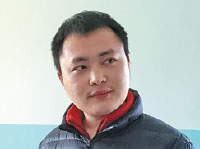

Li Shuai, 28, became a teacher at Beijing Stars and Rain Education Institute for Autism six years ago after graduating from college with a psychology degree.
I teach a class for teenagers. You may be able to tell by the bruises and scratches that line my arms.
Many of the youngsters in my class are unable to control their behavior, and they can often become aggressive. They are tall, and some of them are strong, too, so it's not usual for me to receive a few scratches when I intervene to stop an autistic student acting out.
My elbow still has a bruise from where a student hit me with a book.
Added to the fact they have autism, a lifelong developmental disability that affects their communication with others, these students are also going through puberty, so we have to pay close attention to their emotional state.

The training I give my students is designed to help them become more self-reliant, such as going to the bathroom by themselves. We also work on improving their social interaction and offer lessons in basic working skills, ideally to boost their chances of finding a job in the future and supporting themselves financially.
For example, many autistic people have very poor hand-eye coordination, so I have my students practice by placing a toothbrush and a small tube of toothpaste into a small plastic bag. It sounds simple, but for them it can be tremendously difficult.
Teaching young people with autism is tough. The salary is low and the chance of getting injured is high. I'll admit I thought about quitting the institute early on. But I decided to stay. These youngsters are pure and kind, and I knew I'd regret it if I left.
Luckily, my parents are very supportive. They tell me that I'm doing something meaningful, and when the work gets too much I simply take a quiet walk to clear my head.
Li Shuai talked to He Na.